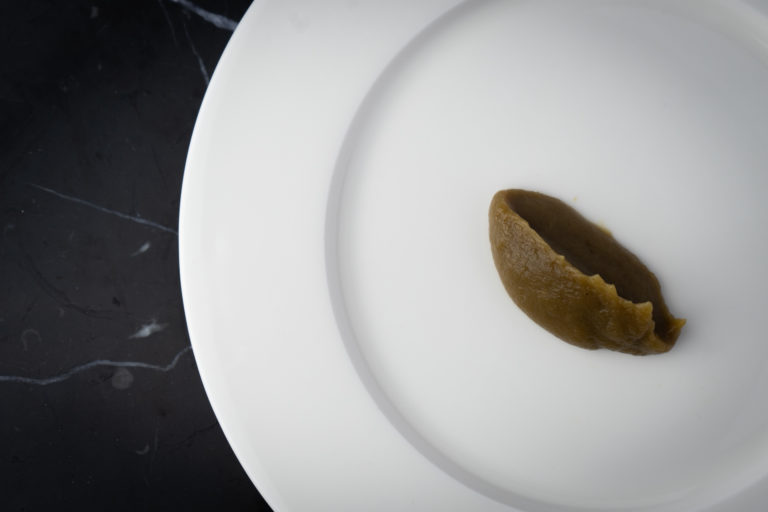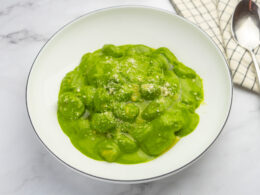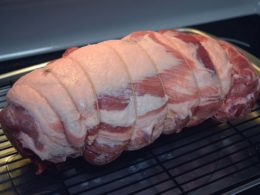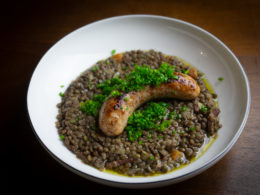Miso shallot puree is a killer accompaniment for a steak with umami from the miso and the sweet, savoury punches from the shallots. A bit of patience is needed due to the fact that you probably will need to ‘reduce’ the purée once blended and passed, however it’s certainly worth the wait.

Purées are a great way to add something interesting to a dish for the home cook. Often many complex recipes require high-tech equipment only found in professional kitchens and are a far-cry from what a home cook can achieve, however this recipe is relatively quick (ok you will need to be a little bit patient!) and straightforward and only requires a pan with a lid, and a blender. The result is a fantastically smooth, complex purée which goes perfectly well with grilled meat.
I’ve highlighted the simple method here (there is a sous vide method which is more hands-off and has a slightly different flavour profile) as you don’t need any specialised equipment.
Print
Caramelised Shallot Miso Purée
Miso shallot puree is a killer accompaniment for a steak with umami from the miso and the sweet, savoury punches from the shallots.
- Total Time: 40 minutes
- Yield: 4 people 1x
Ingredients
- 500 g shallots
- 50 g butter (unsalted)
- 1 tbsp miso paste
- 1 tbsp cooking oil
- 200 ml water
Instructions
- Peel and cut off both ends of the shallots, you then need to slice them lengthways so you’ve you have two flat sides (2 halves) which will face down on the pan to caramelise. Do this for all the shallots.
- Preheat a large sauté pan on a medium high heat (7 on my induction burner) and add the butter and a splash of oil. Once melted, add the shallots flat face down.
- Let these fry and caramelise for 4-5 minutes or until brown.
- Once caramelised, add the water and the miso paste and stir to dissolve. Add a lid and reduce the heat to low and braise the shallots in the liquor for 15-20 mins or until tender.
- Drain the shallots and add to a blender or a tall sided container and use a hand blender to blend until completely puréed.
- Now pass the purée through a very fine sieve (you really want a very fine sieve for a good purée). Season to taste (note that you won’t need much salt as the miso paste is salty)
- You can use this as is but if you want a proper restaurant quality purée, it’s best to put the mixture on a low heat and reduce until you have a purée that can hold its shape once on a plat. For me this took 30-40 minutes.
- Prep Time: 10 minutes
- Cook Time: 30 minutes
- Category: Side Dish
- Cuisine: French
Can I replace shallots with onions?
Yes you could replace the shallots with red or white onions but you won’t have the same flavour as with shallots and it won’t be quite as sweet. Ottelenghi has a recipe for roasted white onions with miso that would make an excellent side dish.
What does shallot purée go with?
Anything you want! But I’d say it’s really, really good with steak. It would work with sausages, veal and any leftovers work be great in a breakfast sandwich.
Can you add garlic to the shallots?
Yes certainly, however do not mince the garlic – you will need to slice them not too thinly. You will also need to add them near the end when frying the shallots.
Can you freeze shallot puree?
Yes, it freezes really well. Pour the mixture into a zip-lock freezer bag and slowly close the seal whilst pressing the puree down as flat as possible. The aim here is to remove air and ensuring the puree fills up the entire bag minimising overall volume. This then means it’ll take up less space in the freezer and it’ll defrost quicker!
How long will it keep in the fridge and freezer?
The puree will keep up to 4 days covered in the fridge before it may start to spoil. You’ll be able to keep it in the freezer indefinitely (safely) however the quality will start to deteriorate after 6 months.











